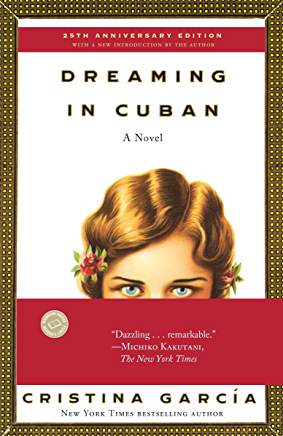
Dreaming in Cuban: 25th Anniversary Edition
by Cristina Garcia
Ballantine Books
randomhousebooks.com
Introduction to the 25th Anniversary Edition
A quarter century? How is that possible? I remember very well finishing Dreaming in Cuban. It was the fall of 1990 and I was living in a seaside cottage on the windward side of Oahu. My daughter, who would be named Pilar—like the feisty teenager in the novel—was still two years from being born. It was a rainy tropical morning when I printed out my final draft of the book (it was called Tropic of Resemblances then, from a beloved Wallace Stevens poem), bundled it up, and drove to Honolulu to express mail it to New York. I can’t recall what, exactly, I whispered to those pages—I can be quite Cuban superstitious—but I definitely wished my novel suerte before sending it on its way.
I couldn’t have dreamed, beyond my wildest dreams, what would happen to my story of four cubanas—Celia, Felicia, Lourdes, and Pilar—and their bitter divisions over the Cuban Revolution. This novel, my first, was loosely based on the politically divided women in my own family: my staunchly communist grandmother in Cuba (who died some years ago at the age of 102); and my equally staunch, anti-Castro mother exiled in Brooklyn. Their stories were the ones I absorbed growing up in New York and, later, on my visits to the island. Had other children, I wondered, grown up in similarly charged political force fields? Were other families afflicted by, what seemed to me, impossible choices of identity and belonging? Was it conceivable to love both one’s mother and grandmother and not be entirely with them, or against them? To choose, instead, to be something in between, or altogether different?
For me, writing Dreaming in Cuban became a poetic inquiry into the nature of allegiances, both familial and political, and an exploration of becoming and belonging in the context and aftermath of cataclysmic historical events. What was the trickle-down effect of the Cuban Revolution on the ordinary lives of ordinary women? How might I chronicle their lives? Do justice to the nature of their triumphs and discontents, their separations and broken hearts? I longed to tell their stories in ways that defied and evaded any one pervasive “truth” but instead permitted them to compete, legitimately, for their own narratives and subjective emotional experiences. Writing these women’s stories, too, enabled me to consider the infinite ways one could be Cuban and Cuban-American, and to accommodate, fictionally at least, radically divergent refractions of reality. It broke, for me, the stranglehold of history’s officialdoms and proclamations and paved the way for more complex, nuanced approaches to storytelling.
Cuba has changed a great deal since 1992, when it was in the depths of the so-called Special Period. Cubans suffered terrible privations resulting from the fall of the old Soviet Union, and its attendant subsidies to the island. Revamped experimentations with tourism and limited private enterprise ensued. Finally, in December 2014, came the announcement that the United States and Cuba would resume diplomatic relations after more than a half-century of hostilities. Then Fidel Castro died in 2016. Amidst all these changes, one thing has remained constant: Cuba and Cubans, whether on the island or in its many diasporas, continue to capture a disproportionate share of the world’s attention and imagination. Whether this is due to Cuba’s geopolitical proximity to the United States, its contributions to world music and culture, or to the vibrancy and, yes, passion of its peoples, Cuba always manages to stay in the global limelight.
I couldn’t be more delighted that Dreaming in Cuban has resonated with so many readers over the years, and I hope that it may continue to do so for many more to come. I would like to dedicate this 25th anniversary edition to my daughter, Pilar Garcia-Brown, who was born in the same year of its publication.
Happy birthday to you both!
—Cristina Garcia, San Francisco, CA, January 2017
From Dreaming in Cuban by Cristina Garcia, Ballantine Books, randomhousebooks.com. Reprinted with permission. All rights reserved.
